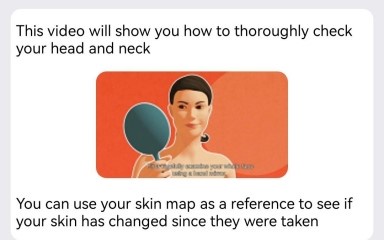An AI-enabled smartphone app to help skin cancer patients is being developed by scientists at the University of Aberdeen, thanks to funding of £421,000 from Cancer Research UK.
The app will help people previously treated for melanoma examine their skin regularly to reduce anxiety and help catch any recurrence of the disease.
A built-in AI chatbot will enable users to upload high quality images and information about worrying skin changes, so concerns can be quickly triaged and dealt with by human healthcare professionals.
The project, led by the University of Aberdeen, has already successfully trialled a tablet app called ASICA with a group of patients who had previously been successfully treated for melanoma.
Around 120 melanoma survivors used the app for a year to regularly check their skin and then send photos and text about any areas of concern to a specialist doctor for review.
The app was found to be effective, leading to quicker resolution of concerns and reducing anxiety for users. However, some users struggled to maintain monthly skin checks and provide high-quality text and images for the specialists to review.
The new funding will go towards developing an enhanced smartphone version of the ASICA app with an integrated AI chat bot which will better support users to check their skin monthly.
Professor Peter Murchie, Chair in Primary Care and lead of the Academic Primary Care Research Group at the University of Aberdeen, said:
“Melanoma can return, and we know the quicker recurrence is diagnosed, the more likely treatment is to be successful.
“If melanoma survivors check their total skin once per month, they are more likely to spot recurrence or if a new melanoma has appeared. They can then get medical attention at the earliest stage.
“We believe this technology will not only be reassuring for patients, help them receive any treatment they need quickly but will also be more efficient, resulting in fewer NHS appointments, lower costs and less travel for patients.
“AI will never replace the need for human healthcare professionals in diagnosing cancer but can be of great support and reassurance for patients and in directing them to healthcare professionals when needed.”
Each year around 17,500 people are diagnosed with melanoma skin cancer in the UK*. With around 2,400 people in the UK sadly losing their lives to the disease annually, finding new ways to tackle the disease is vital**.
Primary teacher, Adele Hughes, from Stonehaven in Aberdeenshire, welcomed the project. The mum of two was diagnosed with melanoma just a month before her 40th birthday.
After six surgeries and 18 cycles of immunotherapy, Adele has now been cancer free for three years, but lives with the awareness that the cancer could return and has regular surveillance scans and check-ups every six months at Albyn Hospital in Aberdeen.
Adele said: “This project represents a fantastic initiative for individuals like myself who have experienced melanoma and continually navigate the possibility of its recurrence.
“This app not only aims to relieve anxiety by providing access to professional healthcare support when necessary, but it also holds the potential to save numerous lives. Its proactive approach could significantly enhance the well-being of those affected by this condition."
Dr Catherine Elliott, Director of Research at Cancer Research UK, said:
“We are delighted to support this innovative research which aims to use emerging technologies to ensure the best possible future for those who have already experienced the devastating impact of a cancer diagnosis.”
The new app will be developed and tested with up to 50 melanoma survivors and around 20 healthcare professionals.
The study team would like to hear from people in region who have been treated for melanoma in the last five-years and healthcare professionals interested in taking part. They can get in touch via asica@abdn.ac.uk to find out more.
In future it’s hoped the project could be developed further to create a deep learning-based computer-assisted decision (CAD) model to support nurse triage.
ENDS


